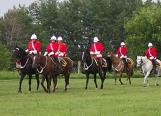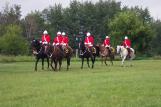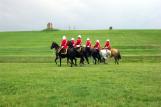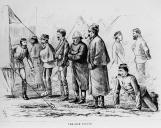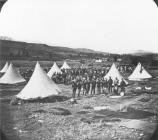14
Entering the Lawless West16
Exhausted after the stampede, the horses and men spent some time resting and reorganizing before French finally ordered the march to begin on July 8, 1974.Before setting out, French did his best to get rid of those men he considered weak. He spoke to the assembled men, warning of the hardships ahead, and inviting those who wished to do so to leave.
18
As a result, only 300 of the 350 men first recruited remained on the force by the time the march began. Of those, some remained behind at Fort Garry, Fort Ellice and Fort Dufferin, leaving 275 officers and men to make the march itself.20
Going was slow from the very beginning. Horses bolted, or refused to move, green troopers had trouble handling wagon teams, and the Métis ox carts lagged so far behind the main group that the troops were asleep for the night before their supplies caught up with them.21
Force and Wagons23
Lack of food for men and horses and lack of water was to plague the force throughout the march. French's plan to drive a herd of cattle along to supply fresh meat proved to be a mistake.The force moved slowly, usually ten miles or less per day, but the wagons and cattle moved more slowly still, and there was never any time to make a proper camp and to cook.
The men lived on biscuits and tea while fighting off mosquitoes, hail and grasshoppers. Men and horses were soon sick.
On day six of the march trooper, Fred Bagley made a tearful confession to his commanding officer, Captain James F. Macleod: "Sir, it's my stomach. I didn't make it off my horse, and, uh, I made a bit of a mess of myself." "Son, half the men have their sphincters clenched as tight as steel drums right now," Macleod replied kindly, though stifling a laugh. "I don't know if it's the water, the food or the god-damn biscuits." Macleod scooped some mud off of his boots and slapped it on Bagley's pants, rubbing it in. "Now nobody'll be any wiser," he said.
24
Resting at Roche Percee26
If the troopers were in bad shape, the horses were far worse. The Toronto animals refused to eat hay cut from pairie grass and oats brought from Fort Dufferin were soon in short supply.The force started to lose animals as they lay down, refused to move on and had to be left behind. On July 22, the force made its second crossing of the Souris River at a difficult point with a steep bank. The effort of hauling horses and supplies across by rope and brute force exausted everyone, and two days later French called for a rest at Roche Percee, southeast of modern Estevan, Saskatchewan.
It was time for a change of plan.
